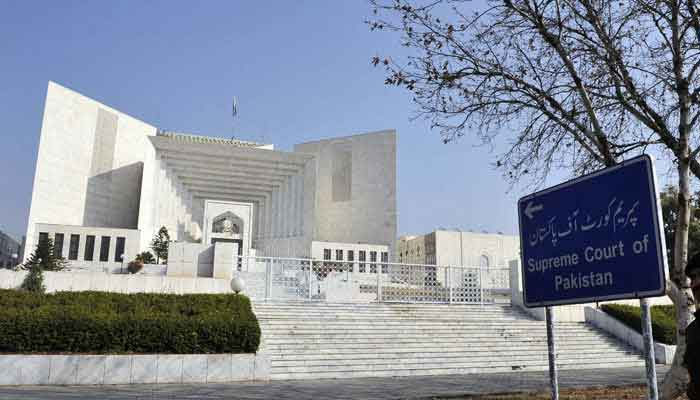Being spouse of judge: Sarina Isa can’t be deprived of constitutional right, Supreme Court
ISLAMABAD: The Supreme Court (SC) on Saturday ruled that Sarina Isa could not be deprived of constitutional right just for being spouse of superior judiciary judge.
The apex court ruled that no one, including a judge of the highest court in the land, is above the law but at the same time, no one, including a judge of the highest court in the land, can be denied his right to be dealt with in accordance with law.
Last year on April 26, a ten–member larger bench headed by Justice Umer Ata Bandial allowed review petitions filed by Justice Qazi Faez Isa and various bar associations against its order of June 19, 2020.
The top court had accepted the review petitions by a majority of 6-4. Justice Maqbool Baqar, Justice Manzoor Ahmad Malik, Justice Aminuddin Khan, Justice Mansoor Ali Shah, Justice Yahya Afridi and Justice Mazhar Alam Khan Miankhel accepted the petitions. However, Justice Isa's review petition was accepted by five judges and dismissed by five judges. Similarly, Yahya Afridi upheld his decision, dismissing the petition of Justice Qazi Faez on June 19, 2020 for not being maintainable but allowed the review petitions, declaring directions contained in the court last year short order of no legal effect.
The court on June 19, 2020 quashed a presidential reference against Justice Isa, but seven of the 10 judges on the bench ordered the Inland Revenue Department and the Federal Board of Revenue (FBR) to seek explanations from the judge’s wife Sarina Isa and children on the funding for three properties in their names in the United Kingdom and submit a report to the Supreme Judicial Council secretary.
While three judges including Justice Maqbool Baqir, Justice Mansoor Ali Shah and Justice Yahya Afridi had made their own order and allowed the same.
Justice Yahya Afridi in his separate note held that in the case of Mrs Sarina Faez Isa, the tax officials on the unlawful directions issued by the ARU Chairman Barrister Shahzad Akbar with the concurrence of the Federal Law Minister Dr Farogh Naseem, breached the statutory confidentiality of Mrs Sarina Faez Isa’s tax returns.
The detailed judgment noted that she was not informed of the action the court was contemplating on taking, nor was she given a chance to state her stance on that.
It further observed that the petitioner could not be penalised and deprived of her constitutional right to be dealt with in accordance with law merely because she is the spouse of a judge and action against her would establish the impartiality of the court.
“The impugned directions mandated him to do that which he could not have done under the law, i.e., the ITO”, says the detailed judgment.
In the present case, the detailed judgment noted that although this court made the impugned directions in good faith to ensure the accountability of a constitutional court judge and to uphold the public trust in the impartiality of the court, but as these directions were made by the court, on its own, without putting to the parties on notice, without informing them what the court was contemplating on doing and without inviting and hearing their arguments on the matters dealt with therein.
It observed that as per constitution, a government officer cannot lodge complaint against judges of superior judiciary.
“I feel constrained to observe that allowing the said delinquents to continue in such important positions of authority by the worthy prime minister, and that too after this court had unanimously declared their actions to be in violation of the Constitution and law, particularly the provisions of section 216 of the Ordinance entailing penal consequences, belies the most elementary principles of “good governance”, and expose the worthy prime minister’s complicity in the commission of the said violations”, Justice Afridi noted.
Thus, the judge added that it is important to ensure that there are no artificial impediments to ensuring accountability of judges, provided accountability is pursued in accordance with law.
Justice Yahya Afridi further held that the tax officials are competent to proceed against the petitioner judge or any other judge of the superior judiciary, serving or retired, his spouse or/and children, without fear or favour, in relation to his or her tax affairs only in accordance with the; provisions of the Income Tax Ordinance, 2001 and not otherwise on the basis of unlawful directions.
He further held that Section 216 of the Income Tax Ordinance, 2001, commands confidentiality of the information of a tax filer, and breach thereof exposes the delinquent to penal consequences under sections 198 and 199 of the Ordinance.
“Such consequences are attracted in the present case to those giving the unlawful directions, namely, ARU Chairman Barrister Mirza Shahzad Akbar with the concurrence of the Federal Law Minister Dr Farogh Naseem; the tax officials executing the unlawful directions in breach of section 216 of the Ordinance; and finally, the worthy prime minister, who despite clear and unanimous finding of misdoings of the named delinquents by this court, retained them in positions of authority, thereby blatantly exposed himself to complicity in the commission of the said violation”, Justice Afridi added.
The judge noted that the petitioner judge or any other serving judge of the superior judiciary lacks the locus standi to invoke the original jurisdiction of this court under Article 184(3), as well as the review jurisdiction therein, as their right to invoke the same stands eclipsed, till they hold the office of a judge of the superior judiciary, essentially to avert a position where their conduct may be seen as unbecoming of a judge, as ordained in Code of Conduct issued by the Council for Judges of the Superior Judiciary. These are the detailed reasons for his short order dated 26.04.2021, which read:
For the reasons to be recorded later, all review petitions except CRP No. 296 of 2020, are allowed and the directions contained in paragraphs No. 4 to 11 of the order dated 19.06.2020 and detail judgment dated 23.10.2020 passed in Constitution Petition No 17 of 2019 and other connected petitions are recalled. Consequently, all the subsequent proceedings, actions, orders and reports made in pursuance of the said directions are declared to be of no legal effect and/or consequences, he concluded.
Meanwhile, Federal Law Minister Dr Farogh Naseem expressed reservation about SC detailed verdict on Justice Isa’s review petition.
He said that SC verdict contained contradictions and government reserved the right to file review petition.
He said if a judge was exonerated of the matters related to his family, why he should declare assets of his family. He said that FBR had declared that Sarina Isa had failed to give her source of income as she had no explanation in this regard and if she could give an explanation, the things would settle down.
-
 Chris Hemsworth Reveals Real Reason He Quit Hollywood Life For Melbourne
Chris Hemsworth Reveals Real Reason He Quit Hollywood Life For Melbourne -
 All You Need To Know About Donald Trump's State Of The Union Address Tonight
All You Need To Know About Donald Trump's State Of The Union Address Tonight -
 Martin Short's Family Confirms Passing Of Daughter Katherine Hartley Short, At The Age Of 42
Martin Short's Family Confirms Passing Of Daughter Katherine Hartley Short, At The Age Of 42 -
 John Davidson Breaks Silence On 2026 BAFTA Awards Racial Slur: 'Please, Don't Judge Me'
John Davidson Breaks Silence On 2026 BAFTA Awards Racial Slur: 'Please, Don't Judge Me' -
 'First Robert Carradine, Now Katherine Short': Fans Mourn Back-to-back Shocking Losses
'First Robert Carradine, Now Katherine Short': Fans Mourn Back-to-back Shocking Losses -
 King Harald Rushed To Hospital As Palace Issues Statement On Health Scare
King Harald Rushed To Hospital As Palace Issues Statement On Health Scare -
 Meghan Markle Gets Dragged For New Lilibet Photo
Meghan Markle Gets Dragged For New Lilibet Photo -
 Prince William To ‘open Doors’ For Middletons, Make Them Royals
Prince William To ‘open Doors’ For Middletons, Make Them Royals -
 Andrew Arrest Fallout: Cops Conclude Six-day Raid At Ex-prince's Home As Misconduct Probe Intensifies
Andrew Arrest Fallout: Cops Conclude Six-day Raid At Ex-prince's Home As Misconduct Probe Intensifies -
 Martin Short Adopted Daughter Katherine Dies By 'suicide' At 42
Martin Short Adopted Daughter Katherine Dies By 'suicide' At 42 -
 Louvre Museum Director Resigns After $104m Crown Jewels Theft
Louvre Museum Director Resigns After $104m Crown Jewels Theft -
 Sarah Ferguson 'crying' After Andrew Arrest
Sarah Ferguson 'crying' After Andrew Arrest -
 Ghislaine Maxwell ‘late Night Massage’ Demands Exposed By Victim
Ghislaine Maxwell ‘late Night Massage’ Demands Exposed By Victim -
 Kristen Bell Gets Honest About Her Marriage To Husband Dax Shepard
Kristen Bell Gets Honest About Her Marriage To Husband Dax Shepard -
 At Least 25 Dead, Hundreds Missing After Flash Floods, Landslides Strike Brazil
At Least 25 Dead, Hundreds Missing After Flash Floods, Landslides Strike Brazil -
 King Charles' Office Breaks Silence After Prince Edward's Last-minute Withdrawal
King Charles' Office Breaks Silence After Prince Edward's Last-minute Withdrawal




